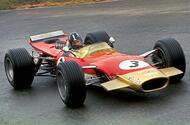How Formula 1 became a global advertising goldmine


Lotus advertised Player’s Gold Leaf brand and more famously JPS years later
“Advertising on racing cars in England doesn’t exactly seem to have taken place by storm, but I gather that several people are working hard behind the scenes with sponsorship deals,” wrote Autocar’s motorsport columnist, Eoin Young, in December 1967.
“It’s interesting that the Rhodesian Gunston tobacco company is considering John Love [reigning champion of the high-profile South African Formula 1 series] for a season on the World Championship circuits.”
And indeed it would be Love and fellow Rhodesian Sam Tingle who would make history at the 1968 season-opening South African Grand Prix as the first drivers of sponsored cars, their Brabham and LDS machinery painted in the bright orange of Gunston’s cigarette packets.
Teams were in a tricky spot financially after BP, Shell and Firestone pulled their support, and so Gunston’s scheme caught the attention of Lotus chief Colin Chapman, and for race two in Spain (weirdly, a full four months later) his cars would appear not in their traditional green and yellow livery but in the red, white and gold of Gold Leaf fags.
This was problematic for British fans wanting to watch Graham Hill win from home, due to the BBC’s and ITV’s unmoving aversion to advertising.
A month prior to the Spanish GP, Autocar had reported on a televised discussion between motorsport and TV management about sponsorship.
“[The BBC’s] Peter Dimmock outlined the position regarding the government’s ban on TV tobacco advertising and said the Lotus tie-up with Gold Leaf had sparked off the situation. Colin Chapman said he was surprised [to hear this] and suggested that it might have been better if Lotus had been contacted [about the issue by TV men] in the first place,” this debate being the first contact he’d had with them.
Enjoy full acccess to the complete Autocar archive at themagazineshop.com
After the Spanish GP blackout, Autocar broke its neutrality about the issue, editor Maurice Smith commenting: “We are told that the TV authorities are prepared to accept static advertisements as an inevitable part of all sporting stadiums since long before TV and radio were invented; but that they cannot allow advertisers to take advantage of the medium by placing decals on ‘prime movers’ in the heart of the action – whether cars, men or whatever.
“That the racing car constructors cannot afford to run teams without such sponsorship [any more], or what might become of motor racing if sponsors withdrew, seems to have been lost from view.
“Though obviously of great importance to the few directly involved, these esoteric aspects of TV ‘big business’ are of no interest whatever to the public, for whom and through whom, solely and exclusively, the TV service exists. Now, all TV broadcasts of motor races are to be suspended until the position has been resolved – showing a total disregard by the TV authorities for their prime responsibility.
“Those of our readers who cannot get to races have left us in no doubt that they resent this whole squabble, and we support their feelings.”
Thankfully, the issue was settled with the BBC that August, meaning Hill’s second title victory at the end of the season wouldn’t be missed.
By then, the floodgates had been opened already: oil companies STP and Elf backed March and Matra, before a wider variety of sponsors came in through the early 1970s.
That wasn’t totally the end of the issue, however: in 1976, British fans missed one of F1’s finest title fights – Niki Lauda versus James Hunt – because Surtees was advertising condoms.
Commentator Murray Walker would later recall: “As far as the BBC was concerned, a visible Durex logo was totally unacceptable for family viewing.”
A few years later, football teams would have to fight a similar fight, as they introduced sponsor logos on players’ shirts. Governing body the FA permitted this from 1977, but broadcasters didn’t.
The BBC even made Coventry City design a special kit for televised games, on the basis that its T-shaped stripes too obviously referenced local car maker Talbot even with the logo removed. Not until 1986 would all sponsorship restrictions be lifted.
Source: Autocar RSS Feed
Recent Posts
Ain’t No God Like God of War
From the original game to 2022's Ragnarok, God of War has shown time and again…
Apple’s M4 Mac mini plunges to $499, lowest price ever
Apple's latest M4 Mac mini is back down to Black Friday pricing, with the standard…
Analyst apologises for mistakenly claiming Final Fantasy 16 sold 3.5m copies
An analyst who claimed Final Fantasy 16 had sold 3.5 million copies has apologised, insisting…
‘Free Speech’ Platfrom X Suspends Opposition Party Accounts in Turkey
The bans follow demonstrations protesting the arrest of Erdoğan's main political rival.
‘MagicMiles’ travel itinerary app now lets users add transportation and lodging
I wrote last year about MagicMiles, a new app that helps users create entire travel…
GLENN DANZIG Has No Plans To Record An Album Anytime Soon: “I Really Don’t Have That Much To Say Musically”
"Maybe I'll do like an EP or something." The post GLENN DANZIG Has No Plans…